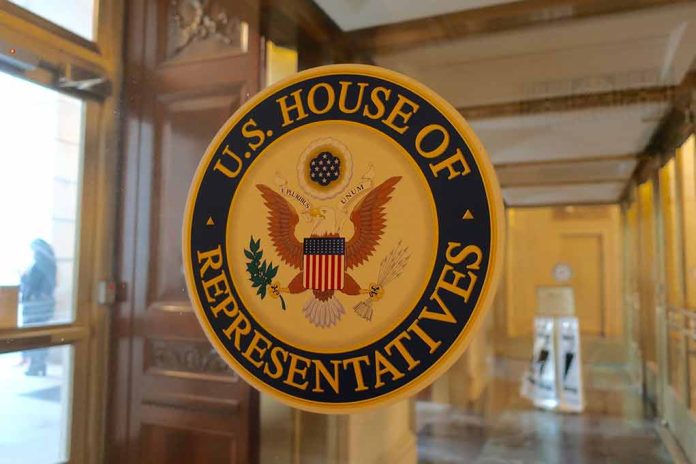
The House of Representatives passes the Laken Riley Act as its first legislation of the 119th Congress, marking a significant bipartisan victory with potential implications for immigration policy.
At a Glance
- The Laken Riley Act passed with a vote of 264 to 159, including support from 48 Democrats
- The bill is named after a 22-year-old nursing student murdered by an illegal immigrant
- It allows states to sue the Department of Homeland Security for harm caused by illegal immigration
- The legislation mandates detention of illegal aliens guilty of certain crimes
- The bill now moves to the Senate, requiring 60 votes to advance
Bipartisan Support for Stricter Immigration Enforcement
In a significant legislative move, the House of Representatives has passed the Laken Riley Act as the first piece of legislation in the 119th Congress. The bill, which garnered substantial bipartisan support with a vote of 264 to 159, including 48 Democrats, aims to strengthen immigration enforcement and address concerns about illegal immigration’s impact on public safety.
The act is named after Laken Riley, a 22-year-old nursing student who was tragically murdered by an illegal immigrant. This case has become a rallying point for those advocating for stricter border control and immigration policies. The legislation’s passage marks a potential shift in the approach to immigration enforcement at the federal level.
Just passed our first legislative bill of the 119th Congress, the Laken Riley Act. I was glad to see bipartisan support for a bill that requires DHS detain illegal immigrants arrested for crimes they've committed, ensuring these criminals are off our streets. Now to the Senate! pic.twitter.com/T0tz4XAEN5
— Congresswoman Jen Kiggans (@RepJenKiggans) January 7, 2025
Key Provisions of the Laken Riley Act
The Laken Riley Act introduces several significant measures aimed at tightening immigration enforcement. One of the most notable provisions allows state attorneys general to sue the federal government for harm caused by the failure to implement immigration policies effectively. This includes the ability to sue the Department of Homeland Security (DHS) for damages resulting from illegal immigration, even for amounts as low as $100.
Additionally, the bill mandates that federal immigration authorities detain illegal aliens who are charged with or convicted of specific crimes, including burglary, theft, larceny, and shoplifting. This provision aims to address concerns about repeat offenders and enhance public safety.
Political Implications and Path Forward
The passage of the Laken Riley Act in the House represents a significant political victory for Republicans, who have been vocal critics of the Biden administration’s immigration policies. House Speaker Mike Johnson criticized Democrats who voted against the bill, emphasizing voter demands for secure borders.
The bill now moves to the Senate, where it faces a more challenging path. It requires 60 votes to advance, and currently, only one Democrat, Sen. John Fetterman, is co-sponsoring the bill. The Senate, under previous Democratic leadership, did not consider the act as a standalone bill. However, with the recent House passage and growing public concern over immigration issues, there may be increased pressure on senators to take action.
Conclusion: A Test of Bipartisanship and Immigration Policy
The Laken Riley Act’s passage in the House with bipartisan support signals a shift in the approach to immigration enforcement. As the bill moves to the Senate, it will serve as a test of both bipartisan cooperation and the legislative priorities of the 119th Congress. The outcome of this legislation would have significant implications for immigration policy and set the tone for future debates on border security and public safety.
Sources:
House passes Laken Riley Act to amp up border enforcement and put pressure on Democrats
House passes Laken Riley Act as 1st bill of new GOP-controlled Congress
Laken Riley Act Approved In House By All Republicans And 48 Democrats



